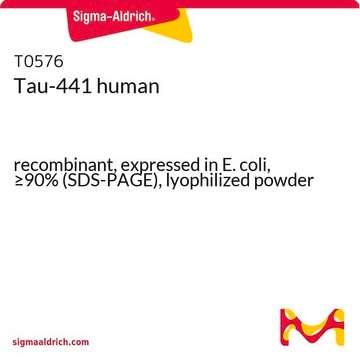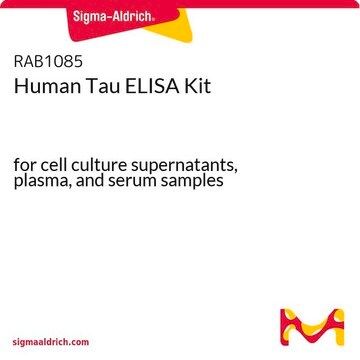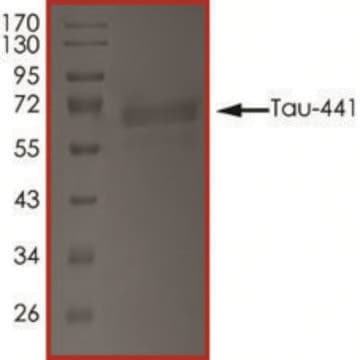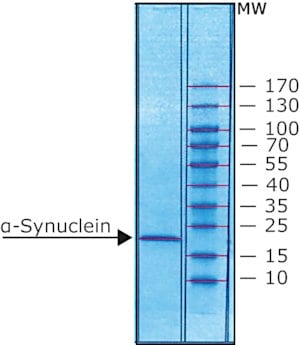T9950
Tau-352 human
recombinant, expressed in E. coli, ≥90% (SDS-PAGE), lyophilized powder
Sinónimos:
Human Tau Protein
Iniciar sesiónpara Ver la Fijación de precios por contrato y de la organización
About This Item
Productos recomendados
biological source
human
Quality Level
recombinant
expressed in E. coli
assay
≥90% (SDS-PAGE)
form
lyophilized powder
mol wt
36.8 kDa
UniProt accession no.
application(s)
cell analysis
shipped in
wet ice
storage temp.
−20°C
Gene Information
human ... MAPT(4137)
Application
Tau-352 human is a Tau isoform, variant 0N3R which means it consists of 3 microtubule binding repeats (R) and no amino terminal inserts (N). The product can be utilized for systemic identification of Phosphorylation sites in microtubule-associated protein tau by using checkpoint kinases Chk1 and Chk2 in vitro.
Biochem/physiol Actions
Tau-383 human belongs to neuronal microtubule-associated protein family that stimulates the microtubule assembly and stability as well as facilitates hyperphosphorylation-induced self-assembly into filaments. Tau protein along with src can upregulate tyrosine kinase activity. Inhibition of Src kinase influences the action of tau on actin rearrangements which in turn impacts the growth-factor-induced actin remodeling.
Isoform of Tau, variant 0N3R, having 3 microtubule binding repeats (R) and no amino terminal inserts (N).
Reconstitution
Lyophilized from MES, pH 6.8, containing NaCl and EGTA. When reconstituted in water to a protein concentration of 1 mg/mL, the resulting buffer will have ~50 mM MES, pH 6.8, 100 mM NaCl, and 0.5 mM EGTA.
Storage Class
11 - Combustible Solids
wgk_germany
WGK 1
flash_point_f
Not applicable
flash_point_c
Not applicable
ppe
Eyeshields, Gloves, type N95 (US)
Certificados de análisis (COA)
Busque Certificados de análisis (COA) introduciendo el número de lote del producto. Los números de lote se encuentran en la etiqueta del producto después de las palabras «Lot» o «Batch»
¿Ya tiene este producto?
Encuentre la documentación para los productos que ha comprado recientemente en la Biblioteca de documentos.
Jhoana Mendoza et al.
Journal of proteome research, 12(6), 2654-2665 (2013-04-05)
Hyperphosphorylation of microtubule-associated protein tau is thought to contribute to Alzheimer's disease (AD) pathogenesis. We previously showed that DNA damage-activated cell cycle checkpoint kinases Chk1 and Chk2 phosphorylate tau at an AD-related site and enhance tau toxicity, suggesting potential roles
Jesus Avila et al.
Physiological reviews, 84(2), 361-384 (2004-03-27)
The morphology of a neuron is determined by its cytoskeletal scaffolding. Thus proteins that associate with the principal cytoskeletal components such as the microtubules have a strong influence on both the morphology and physiology of neurons. Tau is a microtubule-associated
Vandana M Sharma et al.
Journal of cell science, 120(Pt 5), 748-757 (2007-02-08)
The microtubule-associated protein tau interacts with the SH3 domain of non-receptor Src family protein tyrosine kinases. A potential consequence of the SH3 interaction is the upregulation of tyrosine kinase activity. Here we investigated the activation of Src or Fyn by
A Himmler et al.
Molecular and cellular biology, 9(4), 1381-1388 (1989-04-01)
Tau proteins consist of a family of proteins, heterogeneous in size, which associate with microtubules in vivo and are induced during neurite outgrowth. In humans, tau is one of the major components of the pathognomonic neurofibrillary tangles in Alzheimer's disease
M Goedert et al.
Neuron, 3(4), 519-526 (1989-10-01)
We have determined the sequences of isoforms of human tau protein, which differ from previously reported forms by insertions of 29 or 58 amino acids in the amino-terminal region. Complementary DNA cloning shows that the insertions occur in combination with
Nuestro equipo de científicos tiene experiencia en todas las áreas de investigación: Ciencias de la vida, Ciencia de los materiales, Síntesis química, Cromatografía, Analítica y muchas otras.
Póngase en contacto con el Servicio técnico